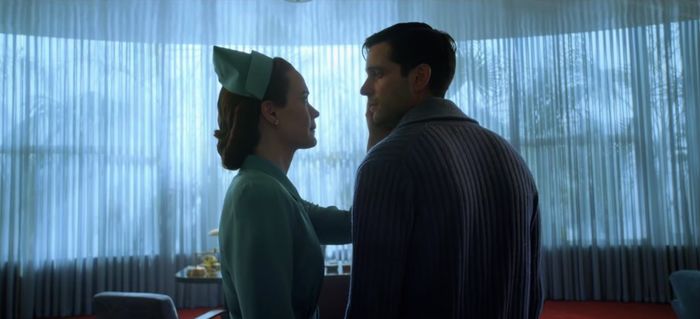Trailblazer: Katharine Hepburn
As part of a spotlight on women in film, columnist Arianna Muñoz looks at the incredible career of Katharine Hepburn.
Film history has no shortage of iconic women. From activists like Jane Fonda to trailblazers like Dorothy Arzner, throughout the decades there have been women who have inspired, challenged, and enthralled audiences with their talents. Yet amidst all these brilliant women there is one in particular who has bewitched my body and soul; who through her eccentricity, defiance, and incredible talent never ceases to amaze: the one and only Katharine Hepburn.
“Katharine Hepburn was the antithesis of what the patriarchal and domineering studio system thought a woman in Hollywood should be.”
What can’t you say about Katharine Hepburn? Named the Greatest Female Screen Legend of All Time by the American Film Institute, during her 60-year career Hepburn set the record for the most Oscar wins in an acting category (four, plus twelve nominations), and worked with everyone from Lucille Ball to Anthony Hopkins. Add to that a blisteringly sharp wit, a passion for feminism and women’s autonomy, and a timeless style that defied gender-roles (those trousers! The three piece suits!), and you have an icon of film history that achieved her immense success by being anything but ordinary.
Hepburn’s rise to fame was as brash and brilliant as Hepburn herself. Scouted during her Broadway run in The Warrior’s Husband, Hepburn was plucked from the world of theatre and brought to RKO studios, making her first film, A Bill of Divorcement, in 1932. Just two films and dozens of positive reviews later, she had already won an Academy Award. It was during this time that Hepburn performed her first iconic role as Jo in the 1933 adaptation of Little Women. In many ways, Hepburn is Jo; strong-willed, assertive, and highly resistant to gender norms. She was determined to never marry, commenting “I liked the idea of being by my own self,” wore slacks and suits, and advocated for herself by negotiating contracts that gave her a degree of agency unheard of in an era when studios could control every aspect of an actor’s life. In short, she was the antithesis of what the patriarchal and domineering studio system thought a woman in Hollywood should be.
All this idiosyncrasy comes to a head in the 1938 comedy classic Bringing Up Baby, starring Hepburn as the ditzy yet headstrong Susan, alongside Cary Grant as the introverted palaeontologist David — two acquaintances inadvertently tasked with taking care of a pet leopard (the titular Baby). In a film packed with zany moments and over-the-top performances, Hepburn is nonetheless an electrifying presence, stealing every scene she is in as she crashes cars into trees, wrangles a leopard, and generally makes David’s life a giant mess. Yet amidst all the hilarity, Hepburn proves she’s more than just comic relief; when David demands that Susan leave his side because of all the disarray she’s caused, Susan crumbles, her confident exterior giving way to heaping sobs as she exclaims: “everything I do with the best intentions seems to turn out badly.” It is an undeniably moving and effective scene that illustrates Hepburn’s talent, transforming the ditzy female comedic trope into a fully realized character, just as tender and poignant as she is spirited and hilarious.
“To watch Katharine Hepburn is to watch a woman who does not care what the world thinks...a proud feminist blazing a path for future generations.”
Hepburn experienced a second peak in her career in the 50s and 60s. The dry humour and dynamic energy that made her a star in her youth remained, as can be observed in the 1968 film The Lion in Winter, which stars Hepburn in an Oscar-winning performance as Eleanor of Aquitaine opposite Peter O’Toole as King Henry II in a political struggle to determine who will be the heir to the throne. A vastly different role from the airheaded and zany Susan, Eleanor is cool, calculating, and intelligent, a snarky quip or fierce rebuttal always on the tip of her tongue, and Hepburn plays her to perfection. During a confrontation between Henry and Eleanor, Hepburn oozes with barely held back pain and vindictiveness, recounting Henry’s cruelty towards her before viciously declaring: “I could peel you like a pear, and God himself would call it justice.” It is just one of many moments in the film where Hepburn demonstrates her extensive skill, a strong and forthright woman filling every frame with her enthralling presence.
It is fitting to discuss Katharine Hepburn now, days after what would have been her 114th birthday, in a time where women in the film industry are asserting themselves both in front of and behind the camera in ways that even just a few years ago would have seemed unimaginable.
To watch Katharine Hepburn, whether it be in her films or the few interviews she gave during her lifetime, is to watch a woman who does not care what the world thinks, who can bring an audience to tears or laughter with equal skill, a proud feminist blazing a path for future generations by demanding nothing less than the best and delivering nothing less than the best.
 Features / Cloudbusting: happy 10th birthday to the building you’ve never heard of30 March 2025
Features / Cloudbusting: happy 10th birthday to the building you’ve never heard of30 March 2025 News / Uni offers AI course for Lloyds employees30 March 2025
News / Uni offers AI course for Lloyds employees30 March 2025 News / Cambridge University Press criticises Meta’s ‘dismaying’ use of copyrighted material28 March 2025
News / Cambridge University Press criticises Meta’s ‘dismaying’ use of copyrighted material28 March 2025 News / Ski mask-wearing teens break into Caius accommodation27 March 2025
News / Ski mask-wearing teens break into Caius accommodation27 March 2025 Sport / Light Blues prevail in thrilling Varsity encounter29 March 2025
Sport / Light Blues prevail in thrilling Varsity encounter29 March 2025






